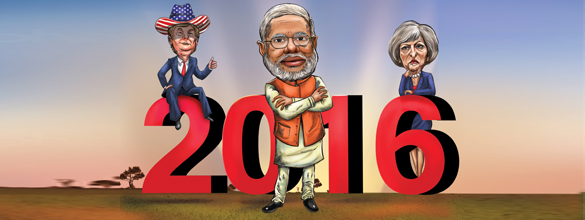India Inc. CEO Manoj Ladwa looks back at the year gone by to weigh up its many disruptions and how they may not all be necessarily damaging.
When one looks back at 2016 from the vantage point of the coming year, one will be forgiven, with the benefit of hindsight, for dubbing it the year of disruptors (and disruptions).
Regardless of where you reside and no matter how you live or what position you hold in your society, at least some of these disruptions are bound to affect your existence. Just look at the sheer number of disruptions that took place – Brexit, the waves of migration into Europe from trouble spots in the Middle East, the election of Donald Trump as President of the US and Prime Minister Narendra Modi’s bold decision to demonetise high denomination currency notes and India overtaking the UK as the fifth largest economy in the world are five that bear instant recall. There have been others as well, but we’ll leave those for another day.
Globally, Trump’s election is, potentially, the biggest game changer. Maverick, brash and inexperienced in international relations, his cowboy approach to the problems afflicting the US could disrupt a fragile world economy and push the globe faster towards another Cold War. He does not seem to have a cogent plan to put the American economy back on the rails and, in his own words, “make America great again”. He has tried to mask the absence of any grand design with a combination of bluster and hyperbole.
For example, his threat to tear up the Trans-Pacific Partnership trade agreement, which covers about 40 per cent of global trade, would actually end up helping China, which he has threatened to keep in check, seal its regional hegemony in the Asia Pacific region and undermine the US’s position as the world’s only superpower. The collateral damage will have to be borne by member-states such as Singapore, Chile, New Zealand, Australia, Brunei, Vietnam, Canada, Mexico, Japan, Peru and Malaysia, among others.
Then, Trump’s threat to force Western Europe, Japan, South Korea and other Nato and non-Nato allies to pay for US military protection could tear apart the fabric of global security that has stood the test of time since the Second World War.
Outsourcing of both manufacturing and services is another red rag for Trump. He has promised to penalise companies that outsource, in effect, creating – not transferring – jobs to countries such as India. The businessman in Trump will know that this is sound economics and getting the benefits of cheaper services and goods increases, and not hobbles, the efficiency and profits of American enterprises. But the US President-elect’s voters obviously don’t understand that. Once in office, he will have to decide which is better – efficient and profitable US corporations that still create high value jobs at home or bloated companies awash in red ink that are forced to lay off workers both at home and abroad.
Of particular interest to India will be his stance on outsourcing IT services and the entry of Indian professionals into the US on temporary work visas. He has spoken in two voices on these – extolling the contribution of India’s highly educated work force to the US economy at gatherings of expat Indians; at other places, he has threatened to penalise companies that outsource IT services. India will be watching very carefully to see which line he follows as President.
These are just three examples. If they’re the kind of solutions Trump has in mind “to make America great again”, then God help the US and the democratic world.
In the context of India, Modi is proving to be a great disruptor. But it’s important to bear in mind that disruptions, though almost always painful, are not necessarily damaging. This distinction, disregarded by ‘The Economist’, which called demonetisation “Modi’s bungle”, missed the woods for the trees by failing to contextualise India’s development paradigm. Yes, even Modi’s most ardent supporters will admit that execution could have been better. But critics seem oblivious to the point that there is not yet any visible public anger at the hardships it has caused. Quite to the contrary, the ordinary Indian seems to have accepted Modi’s urging to undergo short-term pain in exchange for longer term economic benefits.
This is a disruption of humungous proportions. By unleashing the can-do-will-do spirit of the average Indian, Modi is, potentially, uncorking a genie, which, properly channelled, can bear huge dividends in future. Can it? The answer will be known only a few years later, but no one can deny that his disruption has set the cat among the pigeons.![]() Then, Britain’s shock vote to leave the European Union has thrown up both challenges and opportunities for businesses and professionals around the world and particularly for India. The initial euphoria over the possible early conclusion of an FTA and a spike in bilateral trade has subsided; and British Prime Minister Theresa May’s tough stand on issuing student and work visas to Indians has disappointed many in India.
Then, Britain’s shock vote to leave the European Union has thrown up both challenges and opportunities for businesses and professionals around the world and particularly for India. The initial euphoria over the possible early conclusion of an FTA and a spike in bilateral trade has subsided; and British Prime Minister Theresa May’s tough stand on issuing student and work visas to Indians has disappointed many in India.
Now, the hundred-odd large, medium and small Indian companies that had set up shop in the UK are busy burning the midnight oil figuring out how Brexit will affect their plans of using Britain as the entry point into the vast EU common market. The jury is still out on how this disruption will impact the overseas investment plans of many Indian businesses.
And finally, barely a few weeks after Brexit shook up the world comes news that the Indian economy has overtaken, in terms of size, that of its former colonial master. India is still eons away from achieving the levels of per capita income and overall wellbeing prevailing in the UK but the sheer magnitude of this achievement is mind-boggling.
But why am I calling this a disruption? Prior to the 16th century, the East, and more specifically, India and China, were the two largest economies in the world. Colonialism changed the balance of power. Now, globalisation is slowly bringing the world back a full circle. China has already arrived on the world stage as one of the two pre-eminent economic powers. India overtaking the UK in GDP marks this country’s slow but inevitable rise to the high table of the new global order.
Taken together, these disruptions mark the symbolic end of one era – and the birth of a new one.
The Article was first published on India Inc. Website.







